动词时态讲解与练习
完整版)初中英语动词时态练习题及详解

完整版)初中英语动词时态练习题及详解1."I called you at 4:00 XXX。
but no one answered," I said.Sorry。
I was XXX at that time," he replied.2."Excuse me。
where is Mr。
Brown's office?" I asked.Sorry。
I have only worked here for a few days and I don't know," she replied.3."Where is Bob?" I asked.XXX," she replied.4."Don't make so much noise。
The children are having an English lesson," XXX said.5."I was very angry with John—XXX when I spoke to him," she said.6."Are you going to the bank。
Laura?" he asked.No。
I have already been to the bank," she replied.7."Mr。
Black is going to marry a girl he met in Japan last year," she said.8.Many new houses have been built in Wenchuan with thehelp of the government this year.9.My grandmother has seen a lot of changes in Tianjin since she came here.10.The meeting had already begun by the time I got there yesterday.11.Yes。
初中必备英语动词的时态技巧全解及练习题(含答案)
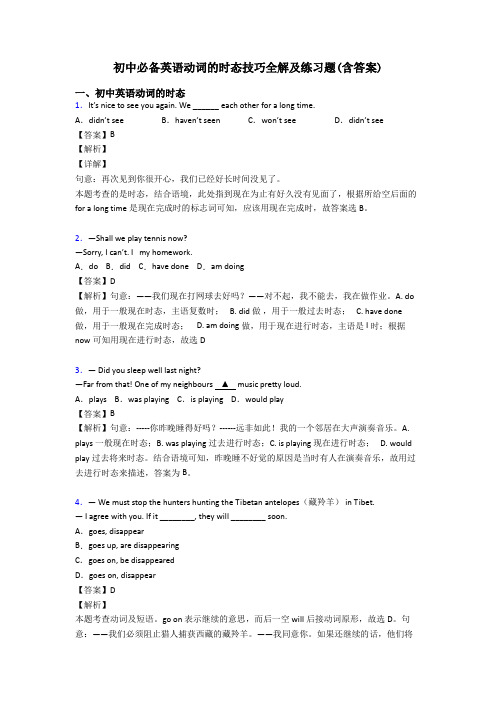
初中必备英语动词的时态技巧全解及练习题(含答案)一、初中英语动词的时态1.It’s nice to see you again. We ______ each other for a long time.A.didn’t see B.haven’t seen C.won’t see D.didn’t see【答案】B【解析】【详解】句意:再次见到你很开心,我们已经好长时间没见了。
本题考查的是时态,结合语境,此处指到现在为止有好久没有见面了,根据所给空后面的for a long time是现在完成时的标志词可知,应该用现在完成时,故答案选B。
2.—Shall we play tennis now?—Sorry, I can’t. I my homework.A.do B.did C.have done D.am doing【答案】D【解析】句意:——我们现在打网球去好吗?——对不起,我不能去,我在做作业。
A. do 做,用于一般现在时态,主语复数时; B. did做,用于一般过去时态; C. have done 做,用于一般现在完成时态; D. am doing做,用于现在进行时态,主语是I时;根据now可知用现在进行时态,故选D3.— Did you sleep well last night?—Far from that! One of my neighbours ▲ music pretty loud.A.plays B.was playing C.is playing D.would play【答案】B【解析】句意:-----你昨晚睡得好吗?------远非如此!我的一个邻居在大声演奏音乐。
A. plays一般现在时态;B. was playing 过去进行时态;C. is playing 现在进行时态; D. would play过去将来时态。
结合语境可知,昨晚睡不好觉的原因是当时有人在演奏音乐,故用过去进行时态来描述,答案为B。
高中英语语法--动词时态讲解及练习

高三英语语法复习:动词时态讲解动词的时态基本框架:动词时态综述:一、一般现在时表示持久存在的动作或状态,或现在的一段时间内经常发生的动作或存在的状态。
1.一般现在时的构成如果主语是第一人称、第二人称和第三人称复数,由行为动词的原形构成;如果主语是第三人称单数,行为动词要变为第三人称单数形式。
一般现在时的标志性词:①表示经常性、习惯性的动作,常与often,usually,always,sometimes,every day等时间状语连用。
I enjoy swimming, a lot and I love diving.我很喜欢游泳,也很喜欢潜水。
①表示现在的特征或状态。
The shop is open eight hours a day.这家商店每天经营8小时。
Many Chinese young kids are quite familiar with McDonald’s but know little about Peking Opera.许多中国小孩非常熟悉麦当劳,对京剧却知之甚少。
①表示客观事实和普遍真理。
Too much carbon dioxide pollutes the atmosphere.太多的二氧化碳污染了大气层。
Quality comes before quantity.质量重于数量。
(客观真理)(2)表示按时间表、规定、计划或安排将要发生的动作,常用be,go,arrive,leave,start,stay,begin等短暂性动词。
Hurry up!Our class begins at 8 o’clock. There is only 5 minutes left.快点儿,我们8点开始上课。
还剩5分钟了。
The plane leaves at three sharp.飞机3点整起飞。
(3)在时间、条件、方式、让步状语从句中表示将来的动作。
Our guides will have guns with them to scare the animals away if they come too close.如果那些动物靠的太近的话,我们的导游会带上枪来吓跑它们。
小学英语语法复习动词时态专项讲解和练习
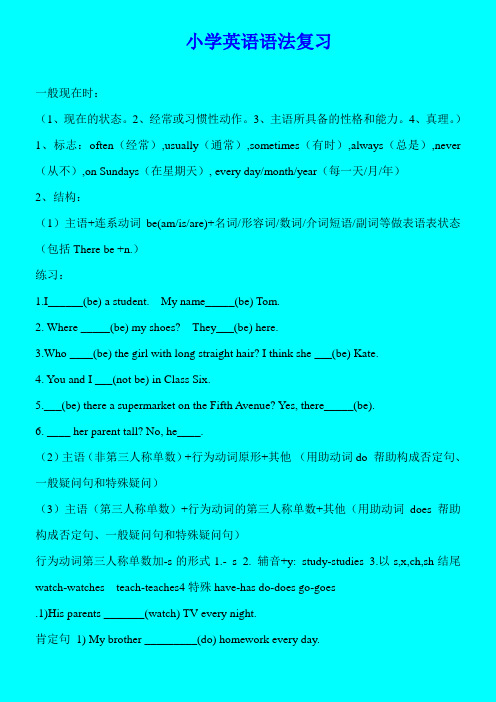
小学英语语法复习一般现在时:(1、现在的状态。
2、经常或习惯性动作。
3、主语所具备的性格和能力。
4、真理。
)1、标志:often(经常),usually(通常),sometimes(有时),always(总是),never (从不),on Sundays(在星期天), every day/month/year(每一天/月/年)2、结构:(1)主语+连系动词be(am/is/are)+名词/形容词/数词/介词短语/副词等做表语表状态(包括There be +n.)练习:1.I______(be) a student. My name_____(be) Tom.2. Where _____(be) my shoes? They___(be) here.3.Who ____(be) the girl with long straight hair? I think she ___(be) Kate.4. You and I ___(not be) in Class Six.5.___(be) there a supermarket on the Fifth Avenue? Yes, there_____(be).6. ____ her parent tall? No, he____.(2)主语(非第三人称单数)+行为动词原形+其他(用助动词do 帮助构成否定句、一般疑问句和特殊疑问)(3)主语(第三人称单数)+行为动词的第三人称单数+其他(用助动词does 帮助构成否定句、一般疑问句和特殊疑问句)行为动词第三人称单数加-s的形式1.- s 2. 辅音+y: study-studies 3.以s,x,ch,sh结尾watch-watches teach-teaches4特殊have-has do-does go-goes.1)His parents _______(watch) TV every night.2)His parents _________(not watch) every night.否定句2)My brother________(not do)homework every day.3)_____his parents_____(watch) TV every night?一般疑3)______ your brother _____ homework every day?Yes, they _______. No, they _______.Yes, he______. No, he _________.4)When___ his parents _____(watch) TV?特疑4)When _____ your brother ____(do) homework?5)They watch TV every night.He does homework every day.二.现在进行时:表示说话瞬间或现阶段正在进行的动作。
动词八大时态用法以及练习总结精华
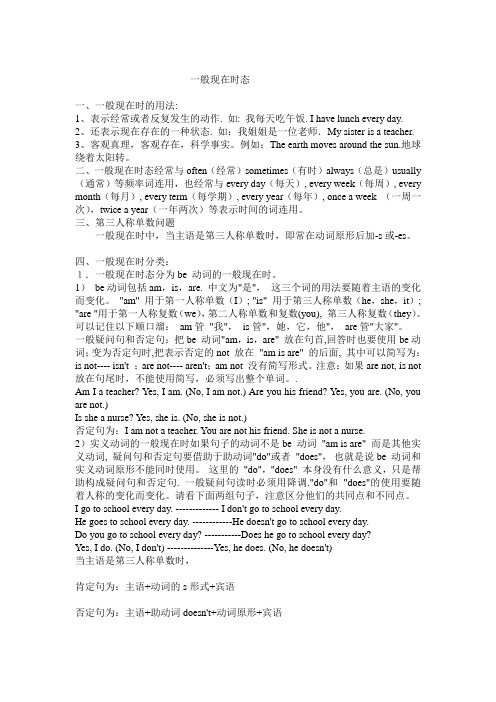
一般现在时态一、一般现在时的用法:1、表示经常或者反复发生的动作. 如: 我每天吃午饭. I have lunch every day.2、还表示现在存在的一种状态. 如:我姐姐是一位老师.My sister is a teacher.3、客观真理,客观存在,科学事实。
例如:The earth moves around the sun.地球绕着太阳转。
二、一般现在时态经常与often(经常)sometimes(有时)always(总是)usually (通常)等频率词连用,也经常与every day(每天), every week(每周), every month(每月), every term(每学期), every year(每年), once a week (一周一次),twice a year(一年两次)等表示时间的词连用。
三、第三人称单数问题一般现在时中,当主语是第三人称单数时,即常在动词原形后加-s或-es。
四、一般现在时分类:1.一般现在时态分为be 动词的一般现在时。
1)be动词包括am,is,are. 中文为"是",这三个词的用法要随着主语的变化而变化。
"am" 用于第一人称单数(I); "is" 用于第三人称单数(he,she,it); "are "用于第一人称复数(we),第二人称单数和复数(you), 第三人称复数(they)。
可以记住以下顺口溜:am管"我",is管",她,它,他",are管"大家"。
一般疑问句和否定句:把be 动词"am,is,are" 放在句首,回答时也要使用be动词;变为否定句时,把表示否定的not 放在"am is are" 的后面, 其中可以简写为:is not---- isn't ;are not---- aren't;am not 没有简写形式。
【英语】初中英语动词的时态及其解题技巧及练习题(含答案)及解析
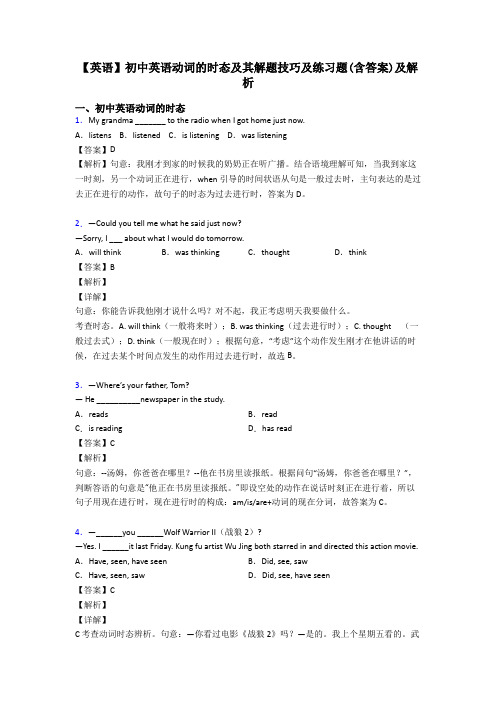
【英语】初中英语动词的时态及其解题技巧及练习题(含答案)及解析一、初中英语动词的时态1.My grandma _______ to the radio when I got home just now.A.listens B.listened C.is listening D.was listening【答案】D【解析】句意:我刚才到家的时候我的奶奶正在听广播。
结合语境理解可知,当我到家这一时刻,另一个动词正在进行,when引导的时间状语从句是一般过去时,主句表达的是过去正在进行的动作,故句子的时态为过去进行时,答案为D。
2.—Could you tell me what he said just now?—Sorry, I ___ about what I would do tomorrow.A.will think B.was thinking C.thought D.think【答案】B【解析】【详解】句意:你能告诉我他刚才说什么吗?对不起,我正考虑明天我要做什么。
考查时态。
A. will think(一般将来时);B. was thinking(过去进行时);C. thought (一般过去式);D. think(一般现在时);根据句意,“考虑”这个动作发生刚才在他讲话的时候,在过去某个时间点发生的动作用过去进行时,故选B。
3.—Where’s your father, Tom?— He __________newspaper in the study.A.reads B.readC.is reading D.has read【答案】C【解析】句意:--汤姆,你爸爸在哪里?--他在书房里读报纸。
根据问句“汤姆,你爸爸在哪里?”,判断答语的句意是“他正在书房里读报纸。
”即设空处的动作在说话时刻正在进行着,所以句子用现在进行时,现在进行时的构成:am/is/are+动词的现在分词,故答案为C。
动词法:时态(讲解与练习)
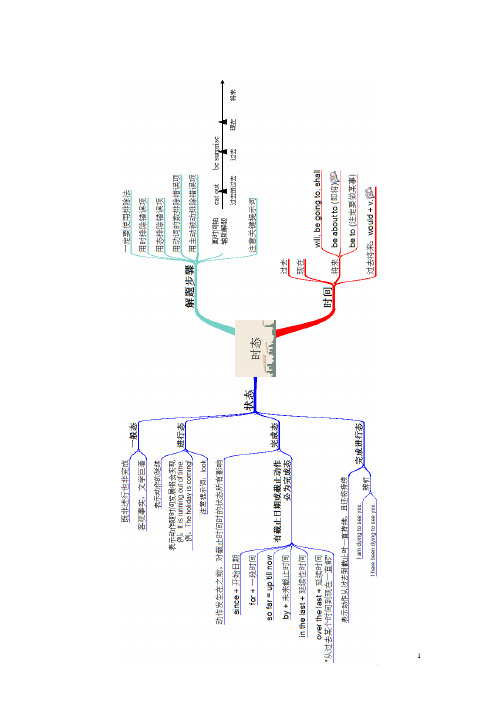
动词法:时态综述时态和语态是高考的必考题,也是高中语法的重点。
由于中文不存在对应的时态概念,因此中国学生常常在学习时态的时候,总是无法很好的理解英语的思维方式。
因此,在解答时态题目的时候,必须适当的使用排除法,以增加做题的正确率。
(时态也是唯一只能用排除法来应对的题目类型)从近年来的出题规律看,单独考时态的题目并不多,这大大降低了时态类题目的难度,使得考生更容易判断出正确的选项。
什么是时态在平时的学习中,我们总是把时态和在一起来学习,这极大地增加了理解的难度,事实上,时态是由两个部分构成的。
1,四种时间概念。
a)现在时b)过去时c)将来时d)过去将来时I didn't know if he would come.She was sixty-six. In three years, she would be sixty-nine.2,四种状态概念。
a)一般态:既非进行也非完成;文学名著与客观事实。
b)进行态:表示动作的持续性发生。
c)完成态:在截止时间发生的时候,已经完成了的事情,对截止时间时发生的事情产生影响。
d)完成进行态:表示从过去到截止时间发生时,持续不断进行并将继续进行的状态。
解题策略●用时间排除错误选项。
【2011全国卷,29】When Alice came to, she did not know how long she ______ there.A. had been lyingB. has been lyingC. was lyingD. has lain分析:从题目上看,要填入选项的地方位于宾语从句之后,由于主句的时间是过去时,因此从句的时间只能是“过去时”,故而可以排除B和D两个表示“现在”时间的选项。
句意为“当Alice苏醒过来时,她不知道她在那儿躺了多久了。
”用以下第二步的判断方式可知,本题有明确截止动作“came to”,意思是苏醒,故使用完成态。
【答案A】【2011北京卷,27】—That must have been a long trip.—Yeah, it ______ us a whole week to get there.A. takesB. has takenC. tookD. was taking【答案】C【解析】句意为“那一定是长途旅行。
中考英语动词时态语法练习及解析
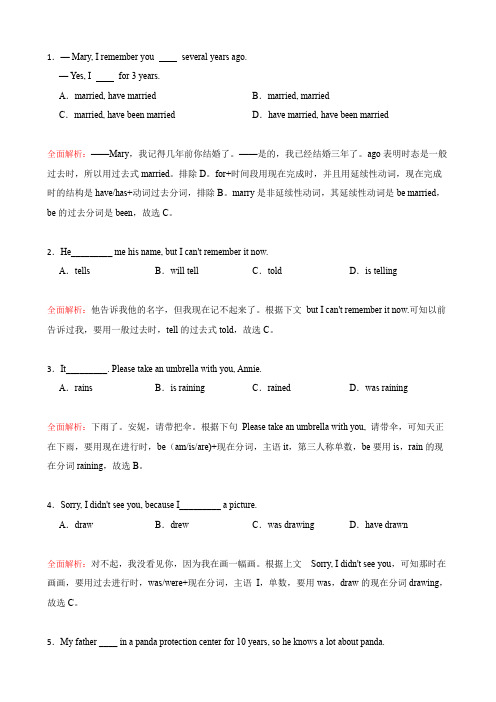
1.— Mary, I remember you several years ago.— Yes, I for 3 years.A.married, have married B.married, marriedC.married, have been married D.have married, have been married全面解析:——Mary,我记得几年前你结婚了。
——是的,我已经结婚三年了。
ago表明时态是一般过去时,所以用过去式married。
排除D。
for+时间段用现在完成时,并且用延续性动词,现在完成时的结构是have/has+动词过去分词,排除B。
marry是非延续性动词,其延续性动词是be married,be的过去分词是been,故选C。
2.He_________ me his name, but I can't remember it now.A.tells B.will tell C.told D.is telling全面解析:他告诉我他的名字,但我现在记不起来了。
根据下文but I can't remember it now.可知以前告诉过我,要用一般过去时,tell的过去式told,故选C。
3.It_________. Please take an umbrella with you, Annie.A.rains B.is raining C.rained D.was raining全面解析:下雨了。
安妮,请带把伞。
根据下句Please take an umbrella with you, 请带伞,可知天正在下雨,要用现在进行时,be(am/is/are)+现在分词,主语it,第三人称单数,be要用is,rain的现在分词raining,故选B。
4.Sorry, I didn't see you, because I_________ a picture.A.draw B.drew C.was drawing D.have drawn全面解析:对不起,我没看见你,因为我在画一幅画。
【英语】初中英语动词的时态的技巧及练习题及练习题(含答案)及解析
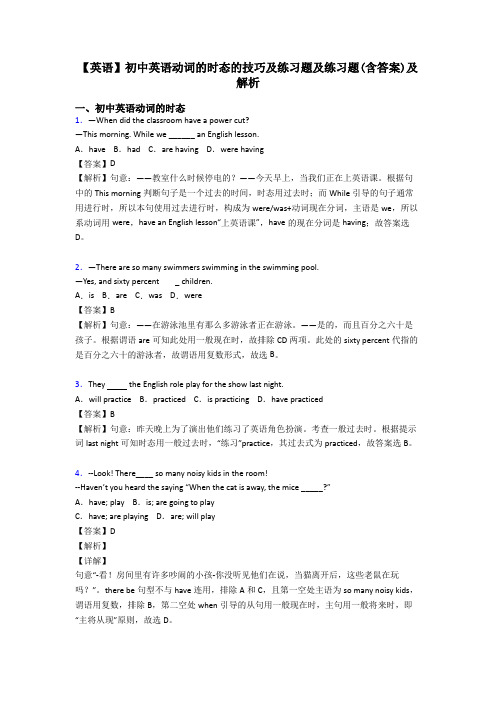
【英语】初中英语动词的时态的技巧及练习题及练习题(含答案)及解析一、初中英语动词的时态1.—When did the classroom have a power cut?—This morning. While we ______ an English lesson.A.have B.had C.are having D.were having【答案】D【解析】句意:——教室什么时候停电的?——今天早上,当我们正在上英语课。
根据句中的This morning判断句子是一个过去的时间,时态用过去时;而While引导的句子通常用进行时,所以本句使用过去进行时,构成为were/was+动词现在分词,主语是we,所以系动词用were,have an English lesson“上英语课”,have的现在分词是having;故答案选D。
2.—There are so many swimmers swimming in the swimming pool.—Yes, and sixty percent _ children.A.is B.are C.was D.were【答案】B【解析】句意:——在游泳池里有那么多游泳者正在游泳。
——是的,而且百分之六十是孩子。
根据谓语are可知此处用一般现在时,故排除CD两项。
此处的sixty percent代指的是百分之六十的游泳者,故谓语用复数形式,故选B。
3.They the English role play for the show last night.A.will practice B.practiced C.is practicing D.have practiced【答案】B【解析】句意:昨天晚上为了演出他们练习了英语角色扮演。
考查一般过去时。
根据提示词last night可知时态用一般过去时,“练习”practice,其过去式为practiced,故答案选B。
动词的时态和语态专题练习

动词的时态和语态专题练习The document was prepared on January 2, 2021高中英语语法时态和语态一.动词的时态时态是谓语动词所表示的动作或情况发生时间的各种形式.英语动词有16种时态,但是常见的只有九种:一般现在时、一般过去时、一般将来时、现在进行时、过去进行时、现在完成时、过去完成时、过去将来时、现在完成进行时.(一)一般现在时do / does1.具体用法1 表示经常性或习惯性动作We always care for each other and help each other. 我们总是互相关心互相帮助.He goes to school every day.2)表示现在的特征或状态He is very happy.Do you sing ----A little.3)表示普遍真理Light travels faster than sound. 光速比声速快.Actions speak louder than words. 行动胜过言语.常与一般现在时态连用的词或短语主要有:often, usually, sometimes, every day, every morning/afternoon, on Sundays/weekends等等.I often go to the cinema on Sundays. 我经常星期天去看电影.He goes to work early every day. 他每天上班很早.二一般过去时 did1表示过去某一特定时间所发生的、可完成的动作或状态,常与表示确切过去时间的词、短语或从句连用.例如:We went to the pictures last night and saw a very interesting film.2表示过去习惯性动作.例如:He always went to class last.I used to do my homework in the library.三一般将来时 will / shall do1表示将来打算进行或期待发生的动作或状态.例如:I shall graduate next year.2一般将来时有时可以表示一种倾向或习惯性动作.如Crops will die without water.You won’t succeed without their support.3 几种替代形式:be going to +v在中广泛使用,表示准备做或将发生的事情.例如:I'm going to buy a house when we've saved enough money.be to +v表示计划安排要做的事,具有"必要"的强制性意义.例如:I am to play tennis this afternoon.be about to +v表示即将发生的事情.例如:He was about to start.be due to +v表示预先确定了的事, 必定发生的事.例如:The train is due to depart in ten minutes.5少数动词如:begin, come, leave, go, arrive, start, stop, return, open, close等的一般现在时可用来表示将来的动作.多用来表示按计划事先安排好即将发生的动作,句中通常还有一个表示将来的时间状语.例如:The meeting begins at seven.The train starts at nine in the morning.四现在进行时 is / are doing1)表示现在某时或某段时间内正在进行的动作.常与现在进行时连用的词组是now, right now,at the mother,for the time being,for the present, 或某个具体的时间几点钟.He is writing a letter now.She is visiting Beijing this week.2)有时用来代替一般现在时态,表示一个经常性动作或状态,这时是为了表示一种感情如赞叹,厌烦,满意,不满等He is always thinking of his work. 表示赞许The boy is always talking in class. 表示不满3 有时用来表示一个在最近按计划或安排要进行的动作这时多有一个表示未来的时间的状语We are leaving on Friday. 我们星期五动身.How many of you are coming to the party五现在完成时have / has done1现在完成时用来表示对目前状况仍有影响的,刚刚完成的动作常与yet,already,just连用,或者过去某一时刻发生的,持续到现在的情况常与for,since连用.例如:I have just finished my homework.Mary has been ill for three days.2常与现在完成时连用的时间状语有:since, for, during, over等引导出的短语;副词already, yet, just, ever, now, before, often, lately, recently等;状语词组this week morning, month, year, so far, up to now, many times, up to the present等.例如:So far, she hasn't enjoyed the summer vacation.There have been a lot of changes since 1978.3完成时态可用在下列结构中:This That, It is was the first second... time +定语从句;This That, It is was the only last + n +定语从句;This That, It is was +形容词最高级+ n +定语从句.如果主句的谓语动词是一般现在时,从句的谓语动词通常用现在完成时;如果主句谓语动词是一般过去时,从句谓语动词通常用过去完成时.例如:1This is one of the rarest questions that have ever been raised at such a meeting.2There was a knock at the door. It was the second time someone had interrupted me that evening.六过去进行时 was / were doing过去进行时表示一个过去的动作发生时或发生后,另一个过去的动作正在进行,或表示过去反复的习惯,常与always,continually,constantly等动词连用.例如:1We were discussing the matter when the headmaster entered.2Whenever I visited him, he was always writing at the desk.七过去完成时 had done1表示过去某时间前已经发生的动作或情况,这个过去的时间可以用by,before等介词短语或一个时间状语从句来表示;或者表示一个动作在另一个过去动作之前已经完成.例如:1We had just had our breakfast when Tom came in.2By the end of last year they had turned out 5, 000 bicycles.2动词expect, hope, mean, intend, plan, suppose, wish, want, desire等用过去完成时,表示过去的希望、预期、意图或愿望等没有实现.例如:I had meant to take a good holiday this year, but I wasn't able to get away.另外两种表示"过去想做而未做的事"的表达方式是:1was / were + to have done sth, 例如:We were to have come yesterday, but we couldn't.2intended expected, hope, meant, planned, supposed, wished, wanted, desired + to have done sth, 如:I meant to have told you about it, but I forgot to do so.3过去完成时常用于以下固定句型:1hardly, scarcely, barely + 过去完成时+ when + 过去时.例如:Hardly had I got on the bus when it started to move.2no sooner +过去完成时+ than +过去时.例如:No sooner had I gone out than he came to see me.3by the end of +过去时间,主句中谓语动词用过去完成时.例如:The experiment had been finished by 4 o'clock yesterday afternoon.八一般过去将来时1. 一般过去将来时的形式Should / would+ 动词原形was / were + 动词-ing形式2. 一般过去将来时常用于宾语从句中,其主语的谓语动词为过去时态,可表示从过去某时看来将要发生的事情,如:He said that he would speak at the meeting.He was sixty-eight. In two years he would be seventy.九现在完成进行时 has / have been doing现在完成进行时表示过去某一时刻之前开始的动作或状态一直延续到过去某一时刻.例如:I have been looking for my lost book for three days, but I still haven't found it.运用动词时态要注意的几个问题一在时间和条件等状语从句中不要用将来时态,如We’ll give him the book if he wants it.He decided to fight back if he was hit again.I’ll call you as soon as I’ve finished my work.二时态的一致时态的呼应,如We saw that the smoke was coming from a window.I didn’t know if she would come.He admitted that he had been on the march.不进行时态调整的情况:1从句说的是一种普遍真理,如:Long ago, people didn’t know the earth moves round the sun.2当从句的谓语改成过去时可能造成误会,如Did he say that the train leaves at 5:30三瞬间动词在完成时态中的使用,如:误:I have received her letter for three months.正:I received her letter three months ago.正:It is three months since I received her letter.四注意某些要求一定时态的句型was/ were doing sth. when …did sth.I was reading a book when the bell rangwas/were about to do sth. when … did sth.We were about to leave when the telephone rang.She was about to go out when it started to rain表示做事做了第几次或共几次,要用完成时态,如:It’s the first time I’ve seen her.We have been there three times.It is / has been… since…It is has been two weeks since I came here.She said it was five hours since she had finished her work.hardly…when…We had hardly got in the crops when it began to rain.Hardly had we got in the crops when it began to rain.no sooner…than…I had no sooner come into the room than the door was closed.No sooner had I come into the room than the door was closed.二.动词的语态语态也是动词的一种形式,英语有两种语态:主动语态和被动语态.主动语态表示主语是动作的执行者,而被动语态表示主语是动作的承受者.1We use electricity to run machines. 主动语态2Electricity is used to run machines. 被动语态1.不能用于被动语态的动词和短语1在英语中,不及物动词不能用于被动语态,但有些不及物动词包括短语容易引起误用.如:appear, belong, belong, die, escape, fall, happen, last, remain, succeed, occur, come true, take place, consist of.2某些表示状态或特征的及物动词,如:become, contain, cost, fit, have, resemble, suit也没有被动语态.2.被动语态的时态形式常用的被动语态有下表所列的几种时态形式.时间一般时进行时完成时现在 am asked am being askedis asked is being askedare asked are being asked过去 was be asked was being askedwere be asked were being asked将来 shall be asked shall have been asked will be asked will have been asked过去 should be asked should have been asked将来 would be asked would have been asked 3.短语动词的被动语态短语动词转换为被动语态时,通常被看作是一个动词,后面的介词或副词不能拆开或省略.例如:1So far no correct conclusion has arrived at.2All the rubbish should be got rid of.4."get + -ed分词"的被动语态"get + -ed分词"结构强调动作的结果,而非动作本身,常用来表示突发性的,出乎意料的偶然事件.例如:The boy got hurt on his way home from work.另外,"get + -ed分词"还可用于谈论为自己做的事,是主动的行为而不是被动的行为.例如:get dressed穿衣服 get divorced离婚get engaged订婚get confused迷惑不解get lost迷路get washed洗脸get married结婚5.被动语态与系表结构的区别1The novel was well written.系表结构2The novel was written by Diskens.被动语态6.不能用于被动语态的及物动词,如:have, fit, hold, lack, cost…I have a computer.The hall can hold 200 people.7. 主动性式表被动意义①当feel、look、smell、taste、sound等后面接形容词时;当cut、read、sell、wear、write等词带状语修饰语时;当动词表示“开始、结束、关、停、转、启动”等意义时.This kind of cloth washes easily.这种布易洗.These novels won’t sell well.这些小说不畅销.My pen writes smoothly.我的钢笔写起来很流畅.The door won’t lock.门锁不上.The fish smells good.鱼闻起来香.②当break out、take place、shut off、turn off、work out等动词表示“发生、关闭、制定”等意思时.The plan worked out successfully.The lamps on the wall turn off.③want, require, need后面的动名词用主动表示被动含义.④be worth doing用主动形式表示被动含义.⑤在“be + 形容词+ to do”中,不定式的逻辑宾语是句子的主语,用主动代被动.This kind of water isn’t fit to drink.The girl isn’t easy to get along with.另外:be to blame受谴责,be to rent出租也用主动形式表被动.Choose the right answer1. They _____ friends since they met in Shanghai.A. have madeB. have becomeC. have beenD. have had2. The secretary is going to report to the manager as soon as he ______.A. will arriveB. arrivesC. is going to arriveD. is arriving3. We all know that ice ______.A. feel coldB. is felt soldC. is feeling coldD. feels cold4. ---This cloth _____ well and _____ long.--- OK. I’ll take it.A. washes ; lastsB. is washed; lastedC. washes, is lastedD. is washing, lasting5. Helen _____ her key in the office so she had to wait until her husband_____ home.A. has left; comesB. left; had comeC. had left; cameD. had left; would come6. It _____ every day so far this week.A. is rainingB. rainedC. rainsD. has been raining7. --- Are you going to the movies tonight--- Yes, I ______ my work by that time.A. will finishB. finishC. am going to finishD. will have finished8. --- Was the driving pleasant when you vacationed in Mexico last summer--- No, it _____ for four days when we arrived, so the roads were very muddy.A. was rainingB. would be rainingC. had been rainingD. has rained9. You won’t know if the coat fits you until you _____ it on.A. will tryB. are tryingC. triedD. have tried10. My dictionary _______, I have looked for it everywhere but still _______.A. has lost; don’t findB. is missing; don’t findC. has lost; haven’t foundD. is missing; haven’t found11. --- How long ______ each other before they _____ married--- For about a year.A. have they known; getB. did they know; were going to getC. do they know; are going to getD. had they known; got12. --- Come in, Peter, I want to show you something.--- Oh, how nice of you. I _____ you _____ to bring me a gift.A. never think; are goingB. never thought; were goingC. didn’t think; are goingD. hadn’t thought; were going13. When Jack arrived he learned Mary _______ for almost an hour.A. had goneB. had set offC. had leftD. had been away14 --- I’m sorry to keep you waiting.--- Oh, not at all. I ______ here only a few minutes.A. have beenB. had beenC. wasD. will15. The police found that the house _______ and s lot of things ______.A. has broken into; has been stolenB. had broken into; had beenstolenC. has been broken into; stolenD. had been broken into; stolen16. --- Have you moved into the house--- Not yet. The rooms ________.A. are being paintedB. are paintingC. are paintedD. are beingpainting17. If the city noises _______ from increasing, people ______ shout to be heard at the dinner table 20 years from now.A. are not kept ; will have toB. are not kept; have toC. do not keep; will have toD. do not keep, have to18. --- ________ the sports meet might be put off.--- Yes, it all depends on the weather.A. I’ve been toldB. I’ve toldC. I’m toldD. I was told19. I don’t think Jim saw me; he ______ into space.A. just stared 凝视B. was just staringC. has just staredD. had just stared20. --- _______ my glasses--- Yes, I _______ them on your bed a minute ago.A. Do you see; sawB. Had you seen; have seenC. Have you seen; sawD. Would you see; saw21. --- We could have walked to the station; it was so near.--- Yes. A taxi _______ at all necessary.A. wasn’tB. hadn’t beenC. wouldn’t beD. won’t be22. --- Who is Jerry Cooper--- ______ I saw you shake hands with him at the meeting.A. Don’t you meet him yetB. Hadn’t you met him yetC. Didn’t you meet him yetD. Haven’t you met him yet23. --- Nancy is not coming tonight.--- But she _______A. promisesB. promisedC. will promiseD. had promised24. _______ it with me and I’ll see what I can do.A. When leftB. LeavingC. If you leaveD. Leave25. It is clear that his poor education _______ him back.A. has been heldB. is holdingC. will be heldD. had held26. --- How are you planning to travel to Shanghai--- I ____ yet, but I ______ taking a train.A. haven’t decided; am consideringB. haven’t decided, considerC. didn’t decided; am consideringD. hadn’t decided; haveconsidered27. The pen I _______ I _______ is on my desk, right under my nose.A. think, loseB. thought , had lostC. think , had lostD. thought, have lost28. --- Have you heard about the new school--- No, when and where to build the new one _______ yet.A. is not decidedB. are not decidedC. hasn’t decidedD. haven’t decided29. --- Sorry, I’m late.--- That’s OK. I _____ long.A. haven’t waitedB. don’t waitC. haven’t been waitingD.didn’t wait30. --- Nancy sat in the front seat on the left side of the classroom.--- Oh I thought she ______ in the back.A. will sitB. had satC. is sittingD. has sat31. I ______ my face when suddenly someone ______ at the door.A. washed, knockedB. washed, was knockingC. was washing, was knockingD. was washing, knocked32. I ______ at the station half an hour ago, but the train _____ yet.A. arrived, hadn’t comeB. was arriving, hadn’t comeC. arrive d, hasn’t comeD. had arrived, didn’t come33. --- Why did you come by taxi--- My car broke down last week and I still _______ it repaired.A. haven’t hadB. didn’t haveC. don’t haveD. won’t have34. I’m surprised to find you here looking well and playing tennis, Jim. Annsaid that you _____ sick.A. areB. wereC. would beD. had been35. The price _________, but I doubt whether it will remain so.A. went downB. will go downC. has gone doneD. was going down36. --- Did you go to Qingdao for vacation last August--- I _______ to go, but I got sick at the last minute.A. was planningB. had been planningC. plannedD. have planned37. I finally got the job I dreamed about. Never in my life _____ so happy.A. did I feelB. I feltC. I had feltD. had I felt38. --- How are you today--- Oh, I ________ as ill as I do now for a very long time.A. didn’t feelB.wasn’t feelingC. don’t feelD. haven’t felt39. The reporter said the UFO ______ east to west when he saw it.A. was travellingB. travelledC. had been travellingD. was totravel40. --- I think that you need ______ practice on playing the violin.--- ______ violin lessons every two weeks, but I think I’ll make it every week from now on.A. less; I haveB. less; I’ve takingC. more; I haveD. more; I’ve been having41. I remember ______ for the job, but I forget the exact number.A. to be paidB. being paidC. get paidD. that I receive pay42. By this time you come, I ______ the task ______ to me last month.A. have finished, givenB. will have finished, to be givenC. will have finished, givenD. have finished, to be given43. There was a knock at the door. It was the second time that someone ______ me that evening.A. to have interruptedB. would have interruptedC. had interruptedD. to interrupt44. ---- It is a long time ______ I saw you last.---- Yes. And it will be a long time ______ we see each other again.A. before, sinceB. since, beforeC. then, thenD. when, when45. We ______ that you would be able to visit us, but you did not.A. hopeB. hopedC. had hopedD. are hoping46. Mary felt both unprepared and nervous about the interview which she______ the next day.A. was bout to faceB. is going to faceC. will faceD. was to face47. In such dry weather, the flowers will have to be watered if they ______.A. have survivedB. are to surviveC. would surviveD. will survive48. ---- Are you member of the club---- ______. It’s ten years since I ______ a member of the club., was B. No, became C. Yes, had been D. No, was49. She ______ law the moment she has finished high school.A. is going to studyB. is to studyC. is about to studyD. will be studying50. The bikes produced in that factory are of high quality. So they ______ well both at home and abroad.A. sellB. are soldC. may be soldD. are to be sold。
动词法:时态入门(详解与练习)
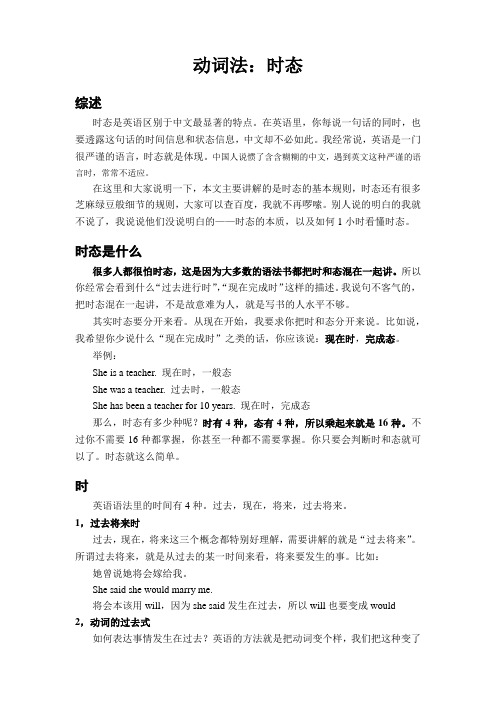
动词法:时态综述时态是英语区别于中文最显著的特点。
在英语里,你每说一句话的同时,也要透露这句话的时间信息和状态信息,中文却不必如此。
我经常说,英语是一门很严谨的语言,时态就是体现。
中国人说惯了含含糊糊的中文,遇到英文这种严谨的语言时,常常不适应。
在这里和大家说明一下,本文主要讲解的是时态的基本规则,时态还有很多芝麻绿豆般细节的规则,大家可以查百度,我就不再啰嗦。
别人说的明白的我就不说了,我说说他们没说明白的——时态的本质,以及如何1小时看懂时态。
时态是什么很多人都很怕时态,这是因为大多数的语法书都把时和态混在一起讲。
所以你经常会看到什么“过去进行时”,“现在完成时”这样的描述。
我说句不客气的,把时态混在一起讲,不是故意难为人,就是写书的人水平不够。
其实时态要分开来看。
从现在开始,我要求你把时和态分开来说。
比如说,我希望你少说什么“现在完成时”之类的话,你应该说:现在时,完成态。
举例:She is a teacher. 现在时,一般态She was a teacher. 过去时,一般态She has been a teacher for 10 years. 现在时,完成态那么,时态有多少种呢?时有4种,态有4种,所以乘起来就是16种。
不过你不需要16种都掌握,你甚至一种都不需要掌握。
你只要会判断时和态就可以了。
时态就这么简单。
时英语语法里的时间有4种。
过去,现在,将来,过去将来。
1,过去将来时过去,现在,将来这三个概念都特别好理解,需要讲解的就是“过去将来”。
所谓过去将来,就是从过去的某一时间来看,将来要发生的事。
比如:她曾说她将会嫁给我。
She said she would marry me.将会本该用will,因为she said发生在过去,所以will也要变成would2,动词的过去式如何表达事情发生在过去?英语的方法就是把动词变个样,我们把这种变了样的动词叫做“过去式”。
比如:is – was(系词在英语里也被认为是一种特殊的动词)are – werelike – likedget – got现在式变成过去式,一般规则是动词后面加ed,郁闷的是,例外的情况特别多。
动词时态语态考点及练习题

时态语态考点及练习考点1 一般时态★★★★★1. 一般现在时(1)表示现在的习惯性、经常性发生的动作或存在的状态, 常与表示频度的时间状语连用, 如usually, often, always, sometimes, every day等。
(2)表示客观事实、真理、格言或者警句等。
(3)表示按照时间表、方案安排好的或者规定的行为, 只限于go, come, leave, start, stop, arrive 等表示动作趋向性或移动意义的词。
The train leaves at six tomorrow morning. 这列火车明早六点出发。
(4)在时间、条件等状语从句中常用一般(现在)时代替一般将来时。
2. 一般过去时(1)表示过去某个时间发生的动作或存在的状态, 常用yesterday, last year, in 1995, the other day等作时间状语。
(2)在时间、条件等状语从句中常用一般过去时代替过去将来时。
He said he would not go if it rained.他说过如果下雨, 他不会去的。
【典题印证】—Hav en’t seen you for ages! Where have you been—I went to Ningxia and(stay)there for one year, teaching as a volunteer.3. 一般将来时(1)一般将来时表示将来某一时刻的动作或状态, 即单纯的将来事实。
(2)三类表示一般将来时的特殊构造:①be going to do sth. 表示方案、打算要做某事或者有预兆要发生某事。
The dark clouds are gathering, so it is going to rain.乌云密布, 眼看就要下雨了。
②be to do sth.表示按方案或安排即将要做某事, 或者按照职责、义务、规定等要做某事。
初中英语语法:动词时态讲解及练习
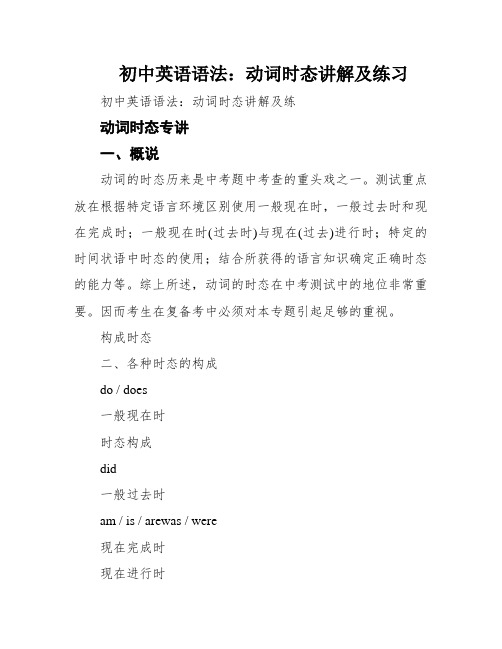
初中英语语法:动词时态讲解及练习初中英语语法:动词时态讲解及练动词时态专讲一、概说动词的时态历来是中考题中考查的重头戏之一。
测试重点放在根据特定语言环境区别使用一般现在时,一般过去时和现在完成时;一般现在时(过去时)与现在(过去)进行时;特定的时间状语中时态的使用;结合所获得的语言知识确定正确时态的能力等。
综上所述,动词的时态在中考测试中的地位非常重要。
因而考生在复备考中必须对本专题引起足够的重视。
构成时态二、各种时态的构成do / does一般现在时时态构成did一般过去时am / is / arewas / were现在完成时现在进行时一般将来时am / is / are + doinghave / has + doneshall / will + do曩昔完成时过去进行时过去将来时was / were + doingwould + dohad + donewas / were going + to doam / is / are going + to do普通目前时三、各种时态的用法1.透露表现经常性或气性的举措,常与透露表现频度的工夫状语连用。
时间状语:every day,every other day,sometimes,often,usually,on Sunday …I leave home for school at 7 _________________ (天天清晨).The Olympic Games are held ____________________ (每四年).What do you ____________ (平日) do when you are free on Sunday?2.用在客观真理,客观存在,科学事实或格言警句中。
The earth _________________ (绕着……转) the sun.Shanghai lies in the east of China.上海__________中国的东方。
专题10 动词四大时态-小学语法精讲精练(附口诀、练习和答案)

小学语法精讲精练专题10 时态思考引入同学们,想跟老师一起来一趟时空之旅吗?想!我们真的可以穿越时空吗?当然不是真的穿越时空啦!老师说的是我们这节课要学的动词时态吧。
哈哈!是的,我说的"时空之旅"就是跟随动词形式变化进行的时态之旅。
我们可以通过动词的不同形式来体现不同时间发生的动作或存在的状态,可以从中体验过去、现在、未来发生的各种趣事!知识概览一、一般现在时一般现在时表示习惯性、永久性的或反复发生的动作或现在存在的状态。
1.一般现在时的结构 (1)肯定结构①主语+ am/is/are +表语知识精讲I am Chinese.我是中国人。
②主语+谓语动词原形/第三人称单数形式(+其他)I like swimming.我喜欢游泳。
③主语+情态动词+谓语动词原形(+其他)I can finish my work today.我今天可以完成我的工作。
(2)否定结构①主语+ am not/isn't/aren't +表语She isn't a nurse.她不是护士。
②主语+ don't/doesn't+谓语动词原形(+其他)I don't like bananas.我不喜欢香蕉。
③主语+情态动词的否定式+谓语动词原形(+其他)We shouldn't run the red light.我们不应该闯红灯。
(3)一般疑问句结构①Is/Are +主语+表语Are you a doctor?你是医生吗?②Do/Does +主语+谓语动词原形(+其他)Do you want to play basketball?你想打篮球吗?③情态动词+主语+谓语动词原形(+其他)Can you jump far,Sam?山姆,你能跳得很远吗?(4)特殊疑问句结构:特殊疑问词+一般疑问句句式What can you do?你会做什么?Who is your father?你的父亲是谁?When does he usually go to school?他通常什么时候上学?2.一般现在时的用法(1)表示经常性或习惯性的动作或存在的状态I take a walk after dinner every day.我每天晚饭后散步。
高中英语动词时态语态讲解及练习

高中英语动词时态语态讲解及练习1、一般现在时ﻫ主要用来表示人、事物的现在状况和特点;表示经常或习惯性的动作,句子中常有often, always,from time totime 等时间状语;表示客观规律和永恒真理等。
He usually goes towork at 7o’clo ck every morning.ﻫThe earth goes around the sun.ﻫGuangzhouis situated in the south of China.考点一:表示永恒的真理,即使出现在过去的语境中,仍用一般现在时。
如:Ilearned tha tthe earth goesaround thesunwhen Iwas inprimaryschool. ﻫ考点二:在时间和条件状语从句中,代替一般将来时;常用的引导词有:时间:when,until, after, before,as soonas, once, the moment/the minute, theday; 条件:if, unless, provided.ﻫIf heacceptsthejob, he will getmore moneysoon.ﻫﻫ考点三:在make sure (certain), see to it,mind,care, matter +宾语从句,从句用一般现在时代替一般将来时。
So long as he works hard,I don’t mind when he finishesthe experimen t.只要他努力工作,我不介意他什么时候做完试验。
ﻫﻫ考点四:在themore… the more … (越……越……) 句型中,若主句是一般将来时, 从句通常用一般现在时。
The harder youstudy, the betterresults you will get.ﻫ2、现在进行时表说话时或目前一段时间内正在进行的活动:或表感情色彩,加强语气。
动词的时态语态讲解及习题
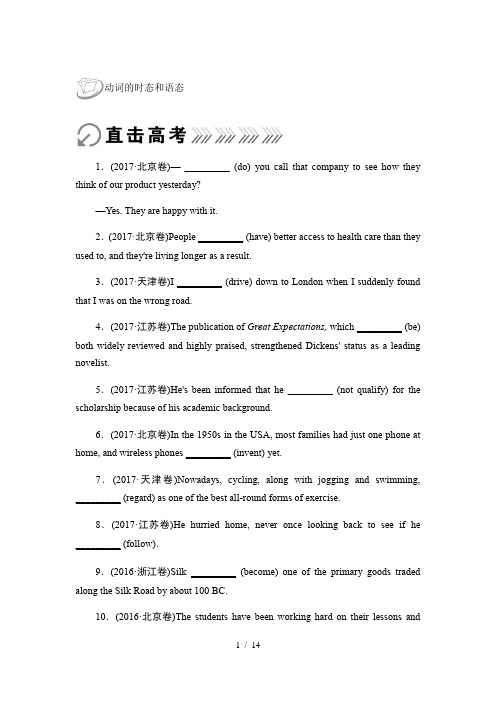
动词的时态和语态1.(2017·北京卷)— _________ (do) you call that company to see how they think of our product yesterday?—Yes. They are happy with it.2.(2017·北京卷)People _________ (have) better access to health care than they used to, and they're living longer as a result.3.(2017·天津卷)I _________ (drive) down to London when I suddenly found that I was on the wrong road.4.(2017·江苏卷)The publication of Great Expectations, which _________ (be) both widely reviewed and highly praised, strengthened Dickens' status as a leading novelist.5.(2017·江苏卷)He's been informed that he _________ (not qualify) for the scholarship because of his academic background.6.(2017·北京卷)In the 1950s in the USA, most families had just one phone at home, and wireless phones _________ (invent) yet.7.(2017·天津卷)Nowadays, cycling, along with jogging and swimming, _________ (regard) as one of the best allround forms of exercise.8.(2017·江苏卷)He hurried home, never once looking back to see if he _________ (follow).9.(2016·浙江卷)Silk _________ (become) one of the primary goods traded along the Silk Road by about 100 BC.10.(2016·北京卷)The students have been working hard on their lessons andtheir efforts _________ (reward) with success in the end.11.(2016·江苏卷)More efforts, as reported, _________ (make) in the years ahead to accelerate the supplyside structural reform.12.(2016·江苏卷)Dashan, who_________ (learn) crosstalk, the Chinese comedic tradition, for decades, wants to mix it up with the Western standup tradition.13.(2016·北京卷)Jack _________ (work) in the lab when the power cut occurred.14.(2016·北京卷)—Excuse me, which movie are you waiting for?—The new Star Wars. We _________ (wait) here for more than two hours.15.(2016·北京卷)I _________ (read) half of the English novel, and I'll try to finish it at the weekend.16.(2015·福建卷)—Where is Peter? I can't find him anywhere.—He went to the library after breakfast and _________ (write) his essay there ever since.17.(2015·湖南卷)As you go through this book, you _________ (find) that each of the millions of people who lived through World War Ⅱ had a different experience.18.(2015·湖南卷)I wasn't able to hide my eagerness when I _________ (ask), “What do you wish me to do now?”19.(2015·北京卷)—Dr. Jackson is not in his office at the moment.—All right. I _________ (call) him later.20.(2015·江苏卷)The real reason why prices _________ (be), and still are, too high is complex, and no short discussion can satisfactorily explain this problem.一、一般现在时的用法1.表示经常性、习惯性的动作或现在的状态、特征。
- 1、下载文档前请自行甄别文档内容的完整性,平台不提供额外的编辑、内容补充、找答案等附加服务。
- 2、"仅部分预览"的文档,不可在线预览部分如存在完整性等问题,可反馈申请退款(可完整预览的文档不适用该条件!)。
- 3、如文档侵犯您的权益,请联系客服反馈,我们会尽快为您处理(人工客服工作时间:9:00-18:30)。
【知识再巩固】
参考答案:
参考答案:1. crowded 2. to stand 3. finished 4. come 5. not to play 6-10 CDADC
一、
1. stops
2. doesn’t rain
3. leaves
4. goes
5. fini shes
6. worries
7. attracts
8. practises
9. prefer 10. called, were 11. will not leave 12. is going to rain 13. would be, Will, come 14. travels 15. Shall, go 16. did, disappear 17. took 18. would start 19. were, stepping, rang 20. will have
二、
1—5 DABBB 6—10 ACBCD 11—15 BCCCD 16—20 AACCA
参考答案
1. making
2. were taking
3. wearing
4. seems
5. allowed
6. doing
7. pierced
8. having
9. to walk 10. is 11. has lived 12. was invented 13. had been 14. had had 15. will visit 16. using 17. making 18. memorizing 19. to have 20. wearing 21. has made 22. to learn 23. to get 24. suggests 25. to close 26. were. Going 27. have 28. playing 29. be listening 30. are 31. has become 32. to go 33.to chat 34. joining 35. keeping 36. have fed 37. have been built 38. stand 39. re aches 40. hadn’t written 41. are looked 42. will return 43. have planted 44. to keep ,waiting 45. to sing 46. walking 47. turning 48. listening 49. is raining 50. would give 51. feel 52. overslept 53. would go 54. to pack , go 55. called 56. brings 57. becoming 58. dropping 59. to eat 60. had left
根据句意,从所给的选项中选出最佳选项。
1-5 DDCBA 6-10 BDCDC 11-15 CCDBB 16-20 DCDBD
21-25 CDCAC 26-30 DCCDC 31-35 BDADB 36-40 CBACA
41-45 DCCBC 46-50 ACCDC 51-54 BBDB
参考答案:(时态专项练习)
1-5 CBDCB 6-10 ABBAA 11-15 BBADD 16-20 BAADB
21-25 CBACA 26-30 ABCBD 31-35 ABCBC 36-40 BBACB
41-45 BABBA 46-50 CDDDA 51-55 BCDBD 56-60 ADDCC
61-65 ACBDC 66-70 DABCB 71-75 BBBBC 76-80 BCADA
初中英语动词时态基础练习
1—5 BABDB 6—10 CDDBA 11—15 BBCCD 16—20 CBDCC
21-25 BDDDA 26—30 BCBAD 31—35 BCCCD 36—40 BDACB
41-45 BDCAC 46—50 BDDCA 51—55 DACBB 56—60 CCDCD
61-65 CADAB 66—70 CBDAB 71—75 CDDBB 76—80 DACBA
81-85 DBDCC 86—90 DDBCA 91—95 BCBDC 96-100 ADCBA。
